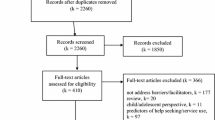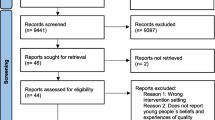Abstract
The aim of the study is to examine the salient ethical factors that arise in caring for transitional-aged cancer patients at the end of life (EOL). This article reviews significant clinical, ethical, and legal considerations relevant to psychologists working in oncology. Transitional-aged youth (TAY, ages 16–24) with cancer face a number of challenges when navigating treatment options at the EOL. Changes in treatment roadmaps, lapses in effective provider–patient communication, disagreements with parents, and developmental and disease-based changes in capacity all become salient in palliative care. Psychologists should be aware that both physician and patient factors influence the types of treatments proposed as well as the extent of EOL discussions. Psychologists are urged to bear in mind the ethical principles of respect for people’s rights and dignity and nonmaleficence to best aid families and multidisciplinary teams navigate this difficult time and promote quality of life and the patient’s wishes.
Similar content being viewed by others
References
Albert, D., & Steinberg, L. (2011). Judgment and decision making in adolescence. Journal of Research on Adolescence, 21(1), 211–224.
American Psychological Association. (2010). Ethical principles of psychologists and code of conduct. Retrieved December 13, 2019, from https://www.apa.org/ethics/code/.
Appelbaum, P. S. (2007). Assessment of patients’ competence to consent to treatment. New England Journal of Medicine, 357(18), 1834–1840.
Aristizabal, P., Singer, J., Cooper, R., Wells, K. J., Nodora, J., Milburn, M., … Martinez, M. E. (2015). Participation in pediatric oncology research protocols: Racial/ethnic, language and age‐based disparities. Pediatric Blood & Cancer, 62(8), 1337–1344.
Bateman, L. B., White, M. L., Tofil, N. M., Clair, J. M., & Needham, B. L. (2017). A qualitative examination of physician gender and parental status in pediatric end-of-life communication. Health Communication, 32(7), 903–909.
Beresford, B. A., & Sloper, P. (2003). Chronically ill adolescents’ experiences of communicating with doctors: A qualitative study. Journal of Adolescent Health, 33(3), 172–179.
Bosslet, G. T., Pope, T. M., Rubenfeld, G. D., Lo, B., Truog, R. D., Rushton, C. H., … Au, D. H. (2015). An official ATS/AACN/ACCP/ESICM/SCCM policy statement: Responding to requests for potentially inappropriate treatments in intensive care units. American Journal of Respiratory and Critical Care Medicine, 191(11), 1318–1330.
Brand, S. R., Fasciano, K., & Mack, J. W. (2017). Communication preferences of pediatric cancer patients: Talking about prognosis and their future life. Supportive Care in Cancer, 25(3), 769–774.
Britto, M. T., Tivorsak, T. L., & Slap, G. B. (2010). Adolescents’ needs for health care privacy. Pediatrics, 126, e1469–e1476.
Brown, A. E. C., & Slutzky, A. R. (2017). Refusal of treatment of childhood cancer: A systematic review. Pediatrics, 140(6), e20171951.
Cutillo, A., O’Hea, E., Person, S., Lessard, D., Harralson, T., & Boudreaux, E. (2017). The distress thermometer: Cutoff points and clinical use. Oncology Nursing Forum, 44(3), 329–336. https://doi.org/10.1188/17.ONF.329-336.
Ely, E. W., Inouye, S. K., Bernard, G. R., Gordon, S., Francis, J., May, L., … Hart, R. P. (2001). Delirium in mechanically ventilated patients: Validity and reliability of the confusion assessment method for the intensive care unit (CAM-ICU). JAMA, 286(21), 2703–2710.
Fink, A. S., Prochazka, A. V., Henderson, W. G., Bartenfeld, D., Nyirenda, C., Webb, A., … Wilson, M. (2010). Predictors of comprehension during surgical informed consent. Journal of the American College of Surgeons, 210(6), 919–926.
Freyer, D. R. (2010). Transition of care for young adult survivors of childhood and adolescent cancer: Rationale and approaches. Journal of Clinical Oncology, 28(32), 4810.
Frost, D. W., Cook, D. J., Heyland, D. K., & Fowler, R. A. (2011). Patient and healthcare professional factors influencing end-of-life decision-making during critical illness: A systematic review. Critical Care Medicine, 39(5), 1174–1189.
Gray, K. M., & Squeglia, L. M. (2018). Research review: What have we learned about adolescent substance use? Journal of Child Psychology and Psychiatry, 59(6), 618–627.
Harrison, J., Evan, E., Hughes, A., Yazdani, S., Federman, M., & Harrison, R. (2014). Understanding communication among health care professionals regarding death and dying in pediatrics. Palliative & Supportive Care, 12(5), 387–392.
Ilowite, M. F., Cronin, A. M., Kang, T. I., & Mack, J. W. (2017). Disparities in prognosis communication among parents of children with cancer: The impact of race and ethnicity. Cancer, 123(20), 3995–4003.
Johnston, D. L., & Vadeboncoeur, C. (2012). Palliative care consultation in pediatric oncology. Supportive Care in Cancer, 20(4), 799–803.
Katz, A. L., Webb, S. A., & Committee on Bioethics. (2016). Informed consent in decision-making in pediatric practice. Pediatrics, 138(2), e20161485.
Kroenke, K., & Spitzer, R. L. (2002). The PHQ-9: A new depression diagnostic and severity measure. Psychiatric Annals, 32(9), 509–515.
Kulkarni, S. P., Karliner, L. S., Auerbach, A. D., & Pérez-Stable, E. J. (2011). Physician use of advance care planning discussions in a diverse hospitalized population. Journal of Immigrant and Minority Health, 13(3), 620–624.
Lamont, S., Jeon, Y. H., & Chiarella, M. (2013). Assessing patient capacity to consent to treatment: An integrative review of instruments and tools. Journal of Clinical Nursing, 22(17–18), 2387–2403.
Linton, J. M., & Feudtner, C. (2008). What accounts for differences or disparities in pediatric palliative and end-of-life care? A systematic review focusing on possible multilevel mechanisms. Pediatrics, 122(3), 574–582.
Mack, J. W., Cook, E. F., Wolfe, J., Grier, H. E., Cleary, P. D., & Weeks, J. C. (2007). Understanding of prognosis among parents of children with cancer: Parental optimism and the parent-physician interaction. Journal of Clinical Oncology, 25(11), 1357–1362.
Mack, J. W., & Wolfe, J. (2006). Early integration of pediatric palliative care: For some children, palliative care starts at diagnosis. Current Opinion in Pediatrics, 18(1), 10–14.
Moberg, P. J., & Kniele, K. (2006). Evaluation of competency: Ethical considerations for neuropsychologists. Applied Neuropsychology, 13(2), 101–114.
National Cancer Institute Center for Cancer Research. (2019). About rare cancers. Retrieved December 13, 2019, from https://www.cancer.gov/pediatric-adult-rare-tumor/rare-tumors/about-rare-cancers.
Parsons, H. M., Harlan, L. C., Lynch, C. F., Hamilton, A. S., Wu, X. C., Kato, I., … Keegan, T. H. (2012). Impact of cancer on work and education among adolescent and young adult cancer survivors. Journal of Clinical Oncology, 30(19), 2393.
Parsons, H. M., Harlan, L. C., Seibel, N. L., Stevens, J. L., & Keegan, T. H. (2011). Clinical trial participation and time to treatment among adolescents and young adults with cancer: Does age at diagnosis or insurance make a difference? Journal of Clinical Oncology, 29(30), 4045.
Pillai, R. K., & Jayasree, K. (2017). Rare cancers: Challenges & issues. The Indian Journal of Medical Research, 145(1), 17.
Pousset, G., Bilsen, J., De Wilde, J., Benoit, Y., Verlooy, J., Bomans, A., … Mortier, F. (2009). Attitudes of adolescent cancer survivors toward end-of-life decisions for minors. Pediatrics, 124(6), e1142–e1148
Ross, L. F. (2009). Against the tide: Arguments against respecting a minor’s refusal of efficacious life-saving treatment. Cambridge Quarterly of Healthcare Ethics, 18(3), 302–315.
Sessums, L. L., Zembrzuska, H., & Jackson, J. L. (2011). Does this patient have medical decision-making capacity? JAMA, 306(4), 420–427.
Sisk, B. A., Canavera, K., Sharma, A., Baker, J. N., & Johnson, L. M. (2019). Ethical issues in the care of adolescent and young adult oncology patients. Pediatric Blood & Cancer, 66(5), e27608.
Smith, H. A., Boyd, J., Fuchs, D. C., Melvin, K., Berry, P., Shintani, A., … Sopfe, J. (2011). Diagnosing delirium in critically ill children: Validity and reliability of the Pediatric Confusion Assessment Method for the Intensive Care Unit. Critical Care Medicine, 39(1), 150.
Spitzer, R. L., Kroenke, K., Williams, J. B., & Löwe, B. (2006). A brief measure for assessing generalized anxiety disorder: the GAD-7. Archives of Internal Medicine, 166(10), 1092–1097.
Thornton, J. D., Pham, K., Engelberg, R. A., Jackson, J. C., & Curtis, J. R. (2009). Families with limited English proficiency receive less information and support in interpreted ICU family conferences. Critical Care Medicine, 37(1), 89.
Wiener, L., McConnell, D. G., Latella, L., & Ludi, E. (2013). Cultural and religious considerations in pediatric palliative care. Palliative & Supportive Care, 11(1), 47–67.
Wiener, L., Zadeh, S., Battles, H., Baird, K., Ballard, E., & Osherow, J. (2012). Allowing adolescents and young adults to plan their end-of-life care. Pediatrics, 130(5), 897–905.
Zadeh, S., & Wiener, L. (2015). Opening end-of-life discussions: How to introduce Voicing My CHOiCES™, an advance care planning guide for adolescents and young adults. Palliative & Supportive Care, 13(3), 591–599.
Zurca, A. D., Fisher, K. R., Flor, R. J., Gonzalez-Marques, C. D., Wang, J., Cheng, Y. I., & October, T. W. (2017). Communication with limited English-proficient families in the PICU. Hospital Pediatrics, 7(1), 9–15.
Author information
Authors and Affiliations
Corresponding author
Ethics declarations
Conflict of interest
Natacha D. Emerson and Brenda Bursch have no conflicts of interest to report.
Human and Animal Rights and Informed Consent
This article does not contain any studies with human or animal subjects performed by any of the authors.
Additional information
Publisher's Note
Springer Nature remains neutral with regard to jurisdictional claims in published maps and institutional affiliations.
Rights and permissions
About this article
Cite this article
Emerson, N.D., Bursch, B. Ethical Issues in Providing End-of-Life Cancer Care for Transitional-Aged Youth. J Clin Psychol Med Settings 28, 781–788 (2021). https://doi.org/10.1007/s10880-021-09764-6
Accepted:
Published:
Issue Date:
DOI: https://doi.org/10.1007/s10880-021-09764-6




